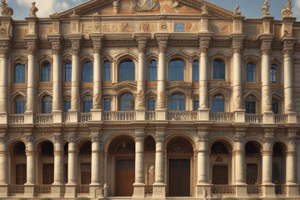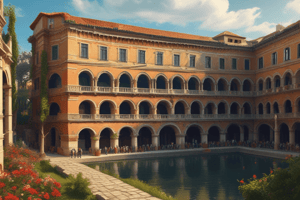Podcast
Questions and Answers
Which city was the birthplace of the Renaissance?
Which city was the birthplace of the Renaissance?
- Florence (correct)
- Genoa
- Milan
- Rome
What was the main source of wealth for Florence during the Renaissance?
What was the main source of wealth for Florence during the Renaissance?
- Fishing
- Cloth-making and trading (correct)
- Agriculture
- Shipbuilding
What was the primary reason for conflict among Italian city-states during the Renaissance?
What was the primary reason for conflict among Italian city-states during the Renaissance?
- Territorial disputes (correct)
- Religion
- Political ideology
- Desire for a powerful emperor
What was the role of diplomacy in Renaissance Italy?
What was the role of diplomacy in Renaissance Italy?
Who was Niccolo Machiavelli and what was his contribution to Renaissance Italy?
Who was Niccolo Machiavelli and what was his contribution to Renaissance Italy?
What was the primary source of wealth for Italian city-states during the Renaissance?
What was the primary source of wealth for Italian city-states during the Renaissance?
What was the societal value of Italian city-states during the Renaissance?
What was the societal value of Italian city-states during the Renaissance?
Who was Marco Polo and what was his contribution to Renaissance Italy?
Who was Marco Polo and what was his contribution to Renaissance Italy?
Which city was the birthplace of the Renaissance?
Which city was the birthplace of the Renaissance?
What was the main source of wealth for Florence during the Renaissance?
What was the main source of wealth for Florence during the Renaissance?
What did Marco Polo do that gave Europeans knowledge about Asia?
What did Marco Polo do that gave Europeans knowledge about Asia?
What was the main reason why Italian city-states were often in conflict with each other?
What was the main reason why Italian city-states were often in conflict with each other?
What was the main reason why Italian city-states gained wealth during the Renaissance?
What was the main reason why Italian city-states gained wealth during the Renaissance?
What was the role of the ruling class in Renaissance Italy?
What was the role of the ruling class in Renaissance Italy?
What was the main reason why some Italian city-states relied on a single powerful individual to run the government?
What was the main reason why some Italian city-states relied on a single powerful individual to run the government?
What did Niccolo Machiavelli write about in Renaissance Italy?
What did Niccolo Machiavelli write about in Renaissance Italy?
What was the primary reason for the conflict among Italian city-states during the Renaissance?
What was the primary reason for the conflict among Italian city-states during the Renaissance?
Which city was known for its canals and shipbuilding during the Renaissance?
Which city was known for its canals and shipbuilding during the Renaissance?
What was the main source of wealth for Genoa during the Renaissance?
What was the main source of wealth for Genoa during the Renaissance?
What was the role of diplomacy in Renaissance Italy?
What was the role of diplomacy in Renaissance Italy?
Who was the author of a critical book about politics in Renaissance Italy?
Who was the author of a critical book about politics in Renaissance Italy?
What was the primary reason for conflict among Italian city-states during the Renaissance?
What was the primary reason for conflict among Italian city-states during the Renaissance?
Who was the Italian explorer who traveled to China and wrote a book about his adventures, which gave Europeans knowledge about Asia?
Who was the Italian explorer who traveled to China and wrote a book about his adventures, which gave Europeans knowledge about Asia?
What was the main reason why some Italian city-states relied on a single powerful individual to run the government?
What was the main reason why some Italian city-states relied on a single powerful individual to run the government?
Who wrote a critical book about politics in Renaissance Italy?
Who wrote a critical book about politics in Renaissance Italy?
Flashcards are hidden until you start studying
Study Notes
The Renaissance in Italy: Birthplace, Rebirth of Classics, City-States, Trade, and Ruling Class
- The Renaissance was a period of interest in learning and arts, marked by a rebirth of classical ideas, and a shift towards secularism.
- Italy was the birthplace of the Renaissance, with wealthy cities like Florence, Venice, Genoa, Milan, and Rome.
- Italian city-states were strong and independent, with a society that valued wealth, trade, and art.
- The Italian city-states were often in conflict with each other, as they did not want a powerful emperor or king to rule over them.
- Italian city-states gained wealth through trade, particularly with China and India, and the demand for luxury goods increased.
- Marco Polo was an Italian explorer who traveled to China and wrote a book about his adventures, which gave Europeans knowledge about Asia.
- Florence was the first major center of the Renaissance, known for its wealth gained from cloth-making and trading, and attracting many artists and architects.
- Venice was another important city, located on the northern coast of the Adriatic Sea, built on small islands, and known for its canals and shipbuilding.
- Old noble families moved to the cities, and many merchants adopted the customs of the nobles, forming a new ruling class.
- Many Italian city-states began as republics, but some relied on a single powerful individual to run the government.
- To deal with neighboring states, the Italians developed diplomacy, and Niccolo Machiavelli wrote a critical book about politics in Renaissance Italy.
- Overall, the Renaissance in Italy was a period of change, marked by a focus on learning, art, wealth, trade, and diplomacy.
The Renaissance in Italy: Birthplace, Rebirth of Classics, City-States, Trade, and Ruling Class
- The Renaissance was a period of interest in learning and arts, marked by a rebirth of classical ideas, and a shift towards secularism.
- Italy was the birthplace of the Renaissance, with wealthy cities like Florence, Venice, Genoa, Milan, and Rome.
- Italian city-states were strong and independent, with a society that valued wealth, trade, and art.
- The Italian city-states were often in conflict with each other, as they did not want a powerful emperor or king to rule over them.
- Italian city-states gained wealth through trade, particularly with China and India, and the demand for luxury goods increased.
- Marco Polo was an Italian explorer who traveled to China and wrote a book about his adventures, which gave Europeans knowledge about Asia.
- Florence was the first major center of the Renaissance, known for its wealth gained from cloth-making and trading, and attracting many artists and architects.
- Venice was another important city, located on the northern coast of the Adriatic Sea, built on small islands, and known for its canals and shipbuilding.
- Old noble families moved to the cities, and many merchants adopted the customs of the nobles, forming a new ruling class.
- Many Italian city-states began as republics, but some relied on a single powerful individual to run the government.
- To deal with neighboring states, the Italians developed diplomacy, and Niccolo Machiavelli wrote a critical book about politics in Renaissance Italy.
- Overall, the Renaissance in Italy was a period of change, marked by a focus on learning, art, wealth, trade, and diplomacy.
The Renaissance in Italy: Birthplace, Rebirth of Classics, City-States, Trade, and Ruling Class
- The Renaissance was a period of interest in learning and arts, marked by a rebirth of classical ideas, and a shift towards secularism.
- Italy was the birthplace of the Renaissance, with wealthy cities like Florence, Venice, Genoa, Milan, and Rome.
- Italian city-states were strong and independent, with a society that valued wealth, trade, and art.
- The Italian city-states were often in conflict with each other, as they did not want a powerful emperor or king to rule over them.
- Italian city-states gained wealth through trade, particularly with China and India, and the demand for luxury goods increased.
- Marco Polo was an Italian explorer who traveled to China and wrote a book about his adventures, which gave Europeans knowledge about Asia.
- Florence was the first major center of the Renaissance, known for its wealth gained from cloth-making and trading, and attracting many artists and architects.
- Venice was another important city, located on the northern coast of the Adriatic Sea, built on small islands, and known for its canals and shipbuilding.
- Old noble families moved to the cities, and many merchants adopted the customs of the nobles, forming a new ruling class.
- Many Italian city-states began as republics, but some relied on a single powerful individual to run the government.
- To deal with neighboring states, the Italians developed diplomacy, and Niccolo Machiavelli wrote a critical book about politics in Renaissance Italy.
- Overall, the Renaissance in Italy was a period of change, marked by a focus on learning, art, wealth, trade, and diplomacy.
Studying That Suits You
Use AI to generate personalized quizzes and flashcards to suit your learning preferences.




